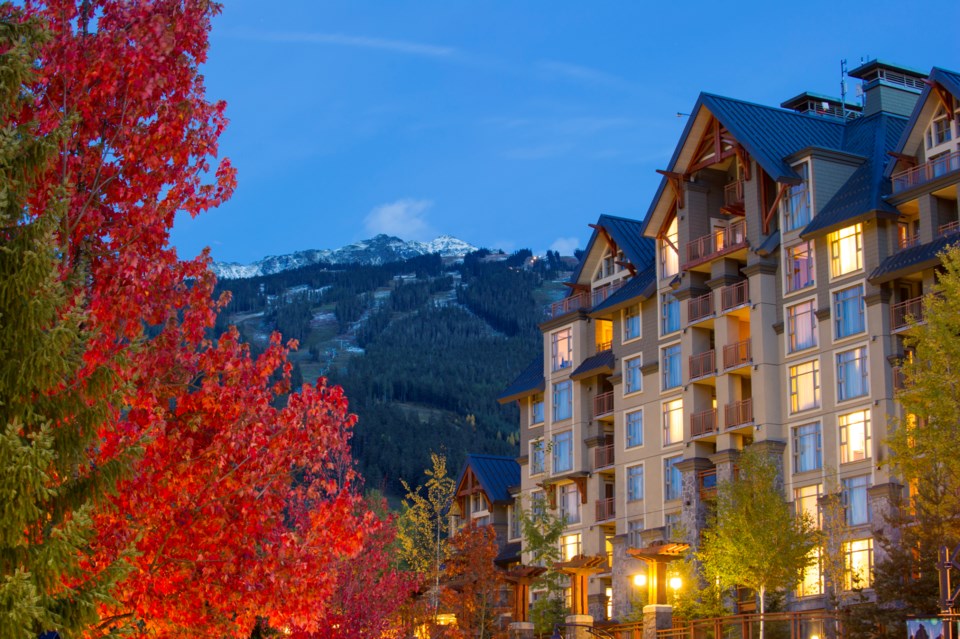Though initial forecasts predicted a “softer” winter season, bookings are beginning to pick up as the temperatures continue to drop, according to Tourism Whistler (TW)—but the same old challenges remain.
“The financial viability of many of our smaller businesses coming out of the pandemic has been tough for them,” said Tourism Whistler’s president and CEO Barrett Fisher, in a presentation to Whistler’s Committee of the Whole on Oct. 10.
“We know that the labour shortage still remains. We’re hearing from most of the large accommodations and [Whistler Blackcomb] that they’re in much better shape when it comes to filling their labour, but that some of the smaller businesses are still struggling.”
Further, despite the “excellent progress” being made by the Resort Municipality of Whistler and Whistler Housing Authority, “we still are hearing of some of those tight pinches when it comes to housing, which impacts affordability,” Fisher said.
And challenges for businesses lead to challenges for consumers.
Rising costs are being passed down to potential visitors to Whistler, which are being seen in everything from airfare and activities to accommodations and meals, Fisher said.
There’s also rising interest rates to contend with, impacting the debt load of tourists.
“The fallout of that is really that we’re seeing either fewer vacation purchases, or when they are coming maybe that they’re spending less,” Fisher said.
Whistler saw a softer summer 2023, business-wise, as compared to the pre-pandemic summer of 2019, “but we did see growth over 2022,” Fisher added.
“And the reason for that is that occupancy in the hotels was kept in 2022 at around 80-per-cent occupancy, whereas that was opened up [this year], and that was due to more labour and front-line people at the hotels.
One big positive is the resort is seeing “very strong” conference business, which is always beneficial for Whistler as conferences typically book in the spring and fall, when the resort is less busy.
“And I should note when Tourism Whistler sets hard targets for high season now, we are no longer looking at growth targets. We are looking at neutralizing that high-season period, so really looking to where is the growth—it’s in midweek or it’s in shoulder-season months,” Fisher said.
“And that’s why conference groups, as well as festivals, events and animation, are a great way to drive that sort of spring, fall and midweek business.”
Looking to the winter ahead, Tourism Whistler was initially anticipating a slower season, “but more recently we have started to see some strong pickup during the festive season and during February, March and April,” Fisher said. “February is still pacing lower than a pre-pandemic February, but where we’re seeing the biggest gaps right now is in that pre-festive week … and then into early January.”
There’s also a “pretty substantive gap” in January, which TW attributes primarily to the Australian market.
“They are big January travellers, and they are not coming back yet in the forces that they historically used to,” Fisher said. “So we’re forecasting to achieve similar occupancy levels, and how we’re making that up is primarily through our continued strength in the B.C. and the domestic markets and the loyal visitation that we see there.”
Looking to 2024, TW’s key areas of focus include growing year-round viability; advancing responsible, sustainable, regenerative tourism; optimizing the visitor experience; and elevating the value of tourism.
One long-term goal is to roll out a resort-wide sustainable tourism benchmarking and accreditation program, Fisher said, adding that Tourism Whistler is also looking at opportunities for facilitating weather-independent activities—particularly in light of Whistler’s theatre closing last year.
“We know that in high season, summer and winter, we have our best foot forward. But how do we continue to support with weather-independent activities?” Fisher asked.
TW has gotten a lot of feedback about the theatre closing, she added.
“We manage and operate the Rainbow Theatre [at the Whistler Conference Centre]. It’s a little premature to think that we can open that as a theatre, because it is utilized for conference groups and because it has been renovated recently—it’s not really set up for popcorn and cokes spilling on the floor,” Fisher said. “But that aside, we recognize that activities like that are important when we do have rainy days or inclement weather."



